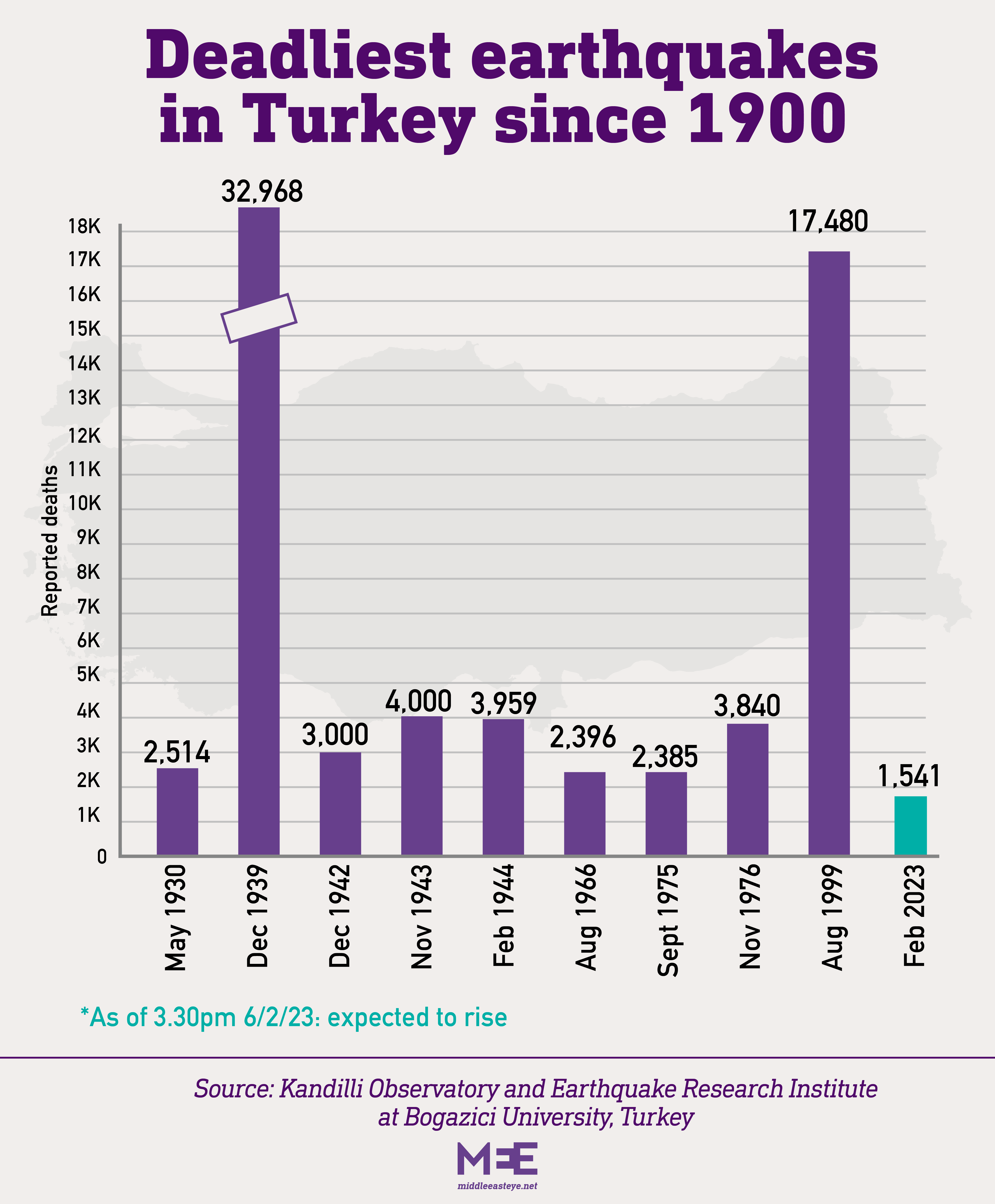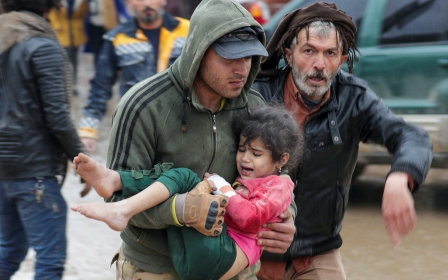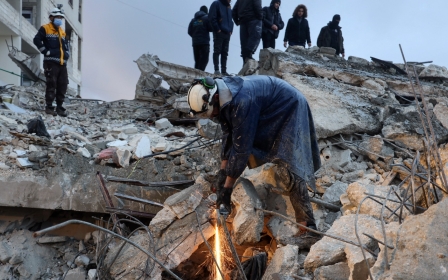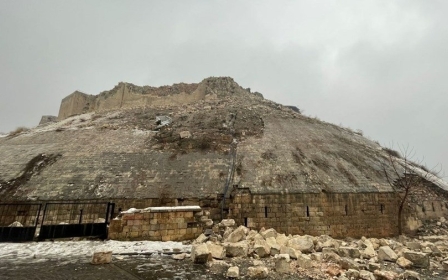Turkey earthquake: Rescue efforts across region after deadliest disaster in decades
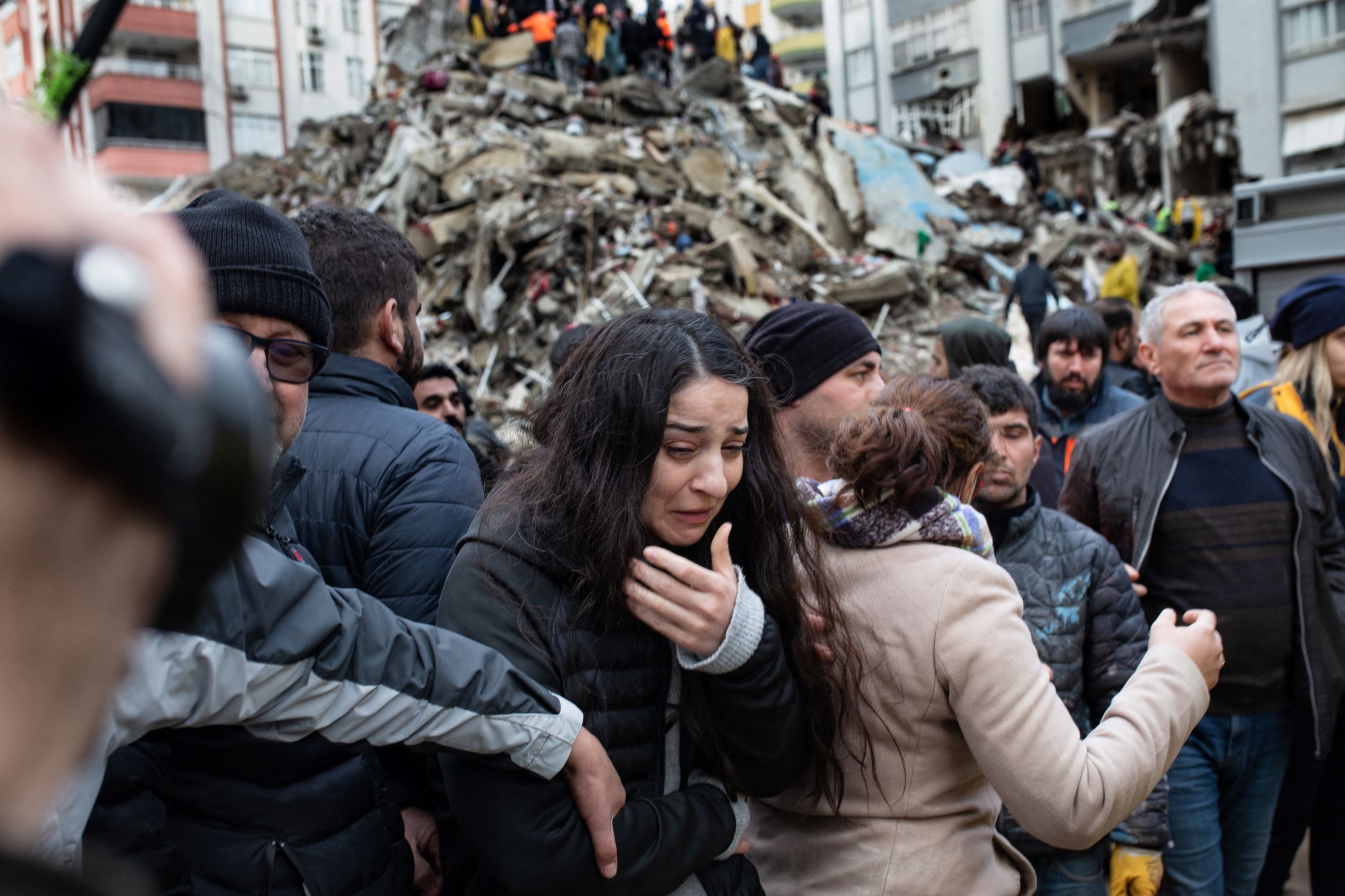
Grief and anxiety have shaken millions as emergency efforts continued across Turkey and Syria following the worst earthquake in decades, with over 4,000 dead.
The two neighbours took the brunt of Monday's disaster, with officials recording 2,921 dead in Turkey and at least 1,444 dead in Syria by the nighttime.
The US Geological Survey said the first 7.8-magnitude quake struck at 4:17 am (0117 GMT) at a depth of about 18km near the southeastern Turkish city of Gaziantep. The earthquake was reportedly felt as far away as Erbil in Iraqi Kurdistan.
Later that morning a second 7.5 magnitude earthquake hit Turkey's Kahramanmaras province.
A doctor at a public hospital in Kahramanmaras, the city at the epicentre of the second quake, described a "disaster zone" and said the aftermath of the earthquake was "much worse than people think".
New MEE newsletter: Jerusalem Dispatch
Sign up to get the latest insights and analysis on Israel-Palestine, alongside Turkey Unpacked and other MEE newsletters
"Roads are blocked [and] everybody is doing their best, but we don't know what will happen," said the doctor who asked not to be named.
More than 6,217 buildings collapsed in Turkey, with most casualties occurring in the southern provinces of Hatay and Gaziantep.
The Turkish cities of Adana, Diyarbakir, Sanliurfa, Osmaniye, and Iskenderun, among others, were also hit.
For its part, Syria's health ministry reported damage across the provinces of Aleppo, Latakia, Hama and Tartous.
Aleppo, a Unesco World Heritage Site, was particularly badly affected, with dozens of buildings collapsing.
Ahmet Tuncay Cakar was sleeping in his home when the earthquake struck Malatya, one of the worst-affected cities in Turkey.
"When the earthquake ended, I told myself Malatya must have been wiped off the map. It was horrendous," said Cakar, whose family home was badly damaged in the earthquake.
Speaking from a relative's home where he and his family have sought refuge, Cakar said roads were blocked with snowfall delaying the rescue effort.
Ahmet Furkan Oguz, a resident of Adana, described the horror of the moment the earthquake struck his home.
"That one minute of tremors felt like years," Oguz told MEE. "We managed to escape the building as soon as the earthquake finished."
Worst since 1939
Turkey has declared a fourth-level emergency and asked for international assistance through the EU's Emergency Response Coordination Centre (ERCC).
Turkish President Recep Tayyip Erdogan said on Monday that 45 countries have responded and offered help with search-and-rescue efforts.
He said the earthquake was the strongest since 1939, when a 7.9 quake hit the eastern city of Erzincan and killed more than 30,000 people.
'It’s been almost two hours now and I still haven't calmed down'
- Damascus resident
Prime Minister Kyriakos Mitsotakis of Greece appeared to set aside years of tensions between the two countries on Monday, with his office saying he telephoned Erdogan to offer "immediate assistance".
His office said Erdogan "thanked" Mitsotakis for the support and the dispatch of rescuers and supplies on board a C-130 military plane.
The United Nations General Assembly also observed a minute of silence in tribute to the victims.
"Our teams are on the ground assessing the needs and providing assistance," UN Secretary-General Antonio Guterres said.
"We count on the international community to help the thousands of families hit by this disaster, many of whom were already in dire need of humanitarian aid in areas where access is a challenge."
'My anxiety is insane'
Survivors of the earthquake in Syria described scenes and feelings of horror in the aftermath of the first shock.
Syrians in the rebel-held northwest, many of whom were displaced by fighting during the country's civil war, described waking to the disaster.
“I live in a tent, so I was not affected by the earthquakes. I was sleeping and woke up when the ground was shaking under me. I fled with my wife and four children and dozens of displaced people towards the plains and lands surrounding the tents,” said Abu Rawad, who lives in Idlib province after being displaced from southern Daraa province by the war.
'After a few hours, we came to the city of Sarmada and found all our relatives under the rubble. The Civil Defence is still trying to find them'
- Abu Rawad, Idlib
“After a few hours, we came to the city of Sarmada and found all our relatives under the rubble. The Civil Defence is still trying to find them," he added, referring to the rescue organisation known internationally as the White Helmets.
“One of my cousins was rescued with broken hands and feet as a result of the collapse of the apartment above him. His wife and children are still under the rubble. My other cousin, his wife and children are still under the rubble. We are impatiently waiting, hoping that God will save them all.”
In Syria, the initial quake struck the provinces of Idlib, Aleppo, Latakia, Tartus and Hama. The aftershocks hit the capital Damascus.
"It’s been almost two hours now and I still haven't calmed down. I feel as if I am walking on a sponge and my anxiety is insane," a resident of Damascus told MEE.
"When I managed to speak to my children I burst into tears."
Former national team footballer Nader Joukhadar and his son Taaj were among those who died in Jableh city, the Syrian Football Association said.
Russia said it had deployed 300 military personnel to Syria to help with the rescue efforts. The defence ministry said in a statement they were "removing rubble, searching for victims and providing them with medical assistance in areas that have experienced the most severe destruction."
Israel's Prime Minister Benjamin Netanyahu also said his country had offered aid to Syria, with whom there are no formal relations, after receiving a request from a "diplomatic source".
However, this was rebuffed by Damascus, who said they "ridiculed and denied the allegations" that they had asked for help from Israel.
Additional reporting by Ayah El-Khaldi
Middle East Eye delivers independent and unrivalled coverage and analysis of the Middle East, North Africa and beyond. To learn more about republishing this content and the associated fees, please fill out this form. More about MEE can be found here.


